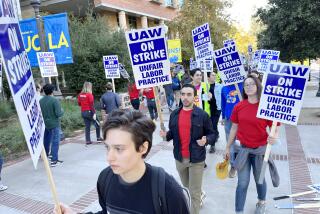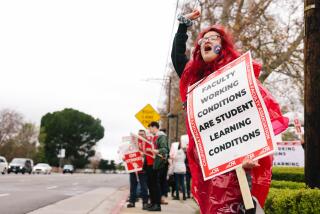Unions: Colleges and the Education of Graduate Assistants
- Share via
As a UCLA graduate student, I find myself uncomfortably in the minority in opposing the student unionizing (“Working-Class Uprising,” April 23). Though I recognize the importance of control over one’s own fate, I part ways with union organizers in their characterization of graduate students as full-fledged employees, rather than as apprentices.
Graduate education is pre-professional training. Teaching assistants are “assistants,” rather than teachers, because they are learning to teach; research assistants learn how to do academic research. In a recent episode of “60 Minutes,” for example, reporter Lesley Stahl condemned the use of graduate students as teachers, claiming they were “unqualified” to teach undergraduates, yet failed to address where graduate students would acquire such qualifications. The answer, of course, is during their academic apprenticeships.
What concerns me most about union protection is its potential for abuse and the creation of a class of “tenured” graduate employees. The United Auto Workers’ Mary Ann Massenburg correctly notes that graduate students are in their jobs for six to 10 years. The graduate employment pie is finite, and the number of graduate students vastly exceeds the number of positions available, particularly the all-important teaching assistantships. Union job protection will unfairly punish graduate students who do not already have positions by reducing turnover among those who do.
Graduate students are a valuable resource; we perform a great deal of the teaching, grading, and research that goes on in classrooms and laboratories across campus. We are also well-paid for these efforts, often at four to five times the national minimum wage. Though the work performed by graduate students is important to the university, it is also important for graduate students’ own futures. Without minimizing the dedication of UCLA’s graduate employees, it is not completely the selfless enterprise suggested by The Times; it is a means of acquiring the tools necessary for a particular profession. It is an apprenticeship, a means to an end--not an end in itself.
RUSSELL A. BURGOS Beverly Hills
More to Read
Sign up for Essential California
The most important California stories and recommendations in your inbox every morning.
You may occasionally receive promotional content from the Los Angeles Times.













